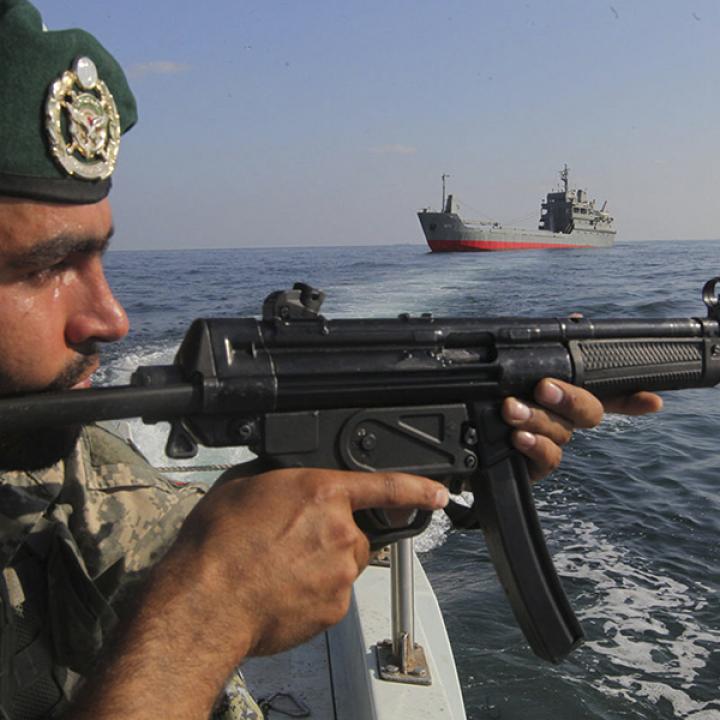
- Policy Analysis
- Articles & Op-Eds
Responding to Iranian Naval Aggression in the Persian Gulf

The latest provocation reinforces the need for any nuclear agreement with Iran to include strong enforcement mechanisms and swift and severe penalties for cheating.
Another commercial vessel has been fired on by Iranian forces in the Persian Gulf, just weeks after Iranian naval forces seized the M/V Maersk Tigris in the Strait of Hormuz and even though maritime law protects vessels engaged in ordinary navigation through international shipping lanes.
These incidents, while troubling, should not be surprising. Iran's Islamic Revolutionary Guard Corps naval forces routinely engage in reckless behavior. Sometimes these incidents amount to close calls: The U.S. Navy said, for example, that Iranian forces had attempted a similar gambit days before the Tigris was seized last month, and in 2008 a U.S. naval vessel eventually fired warning shots at Iranian naval boats threatening them. Sometimes the Iranians' behavior results in full-blown international crises, such as Iran's unprovoked seizure in 2007 of 15 British marines. That such incidents do not occur more frequently is largely due to the professionalism of the U.S. Navy and other services and shipping lines plying the Gulf.
These incidents have concerning implications. Either Iran's supreme leader, Ayatollah Ali Khamenei, approves of the brazen behavior or he is powerless to stop it. Both possibilities are disturbing. If the former is true, it raises questions about Ayatollah Khamenei's willingness to uphold Iran's most basic obligations under international law, which will reinforce suspicions in the region and in Washington about Tehran's trustworthiness. If the latter is true, it suggests that the Iranian Revolutionary Guard forces act independently, which underscores that agreements with Iran are really agreements with one or another faction by which the others do not feel bound.
All of this reinforces the need to ensure that any agreement with Iran about its nuclear program has strong enforcement mechanisms and that penalties for cheating are swift and severe. Any nuclear accord must also be structured to bind the Revolutionary Guard forces, not only Iranian civil authorities. This is best accomplished by requiring Iran to address, up front, questions about its nuclear weaponization research and open its military sites to the same inspections to which civilian sites are subject.
The recent incidents in the Gulf have other ramifications. The free flow of commerce and freedom of navigation are fundamental U.S. interests in the Middle East and, as the U.S. Navy has noted, "vital to regional and global prosperity." When Iranian officials threatened in late 2011 to close the Strait of Hormuz, officials from the Navy's 5th Fleet said that "Anyone who threatens to disrupt freedom of navigation in an international strait is clearly outside the community of nations; any disruption will not be tolerated."
Iranian actions test these warnings at a sensitive time. U.S. allies continue to express skepticism about our willingness to stand up to Iranian aggression in the wake of a nuclear deal. If the United States fails the test, it will further undermine U.S. alliances and the credibility of our commitments, as well as encourage further measures to limit our forces' access in the Gulf and perhaps elsewhere. How we conduct ourselves on the Gulf's torpid waters will do more to reassure or discomfit our allies than any statements issued from Camp David.
Michael Singh is managing director of The Washington Institute. This article originally appeared on the Wall Street Journal blog "Think Tank."
Wall Street Journal


